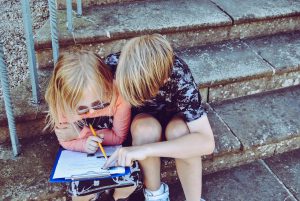
October 15, 2019, by Rupert Knight
Remember remember …
Memory is important in learning so that learning is not lost and this has been the subject of a previous blog in this series. The new Ofsted Education inspection framework is informed by a range of research evidence including on memory and learning (pages 15-17). This evidence includes many new terms from learning sciences that are increasingly heard in primary staff rooms as teachers interpret them and seek to develop practice.
A group of school leaders and academics came together recently at the University of Nottingham School of Education to discuss what we understand about memory and learning and how we use this understanding in our practice to most effectively support children’s learning. In this blog arising from the event, Catherine Gripton summarises some of the discussions.
Memory Principles
Many principles of memory are embedded within good primary practice. We know, for example, that involving children’s senses helps learning (with sensory memory transforming stimuli into information). Some important principles about memory that underpin effective practice in schools are:
• Recognise that attention (interest and engagement) is crucial as unattended information is lost
• Avoid overloading children’s working memory as it has limited capacity and this inhibits learning when capacity is exceeded
• Draw children’s attention to prior knowledge as this prior knowledge helps direct attention to new learning and helps children ‘chunk’ information so that working memory can work more efficiently (important so that learning can happen)
• Get children to elaborate (avoiding simple repetition) and visualise as this effort helps meaning making, supporting long term memory
• Get children to make meaning by explaining to others and themselves (perhaps through speaking or writing) as self-explanation supports memory
• Spread things out to help minimise forgetting
• Bear in mind that sleep is crucial to memory and learning

Teaching strategies based upon memory principles
As seen in publications aimed at teachers such as this EEF guidance report and this paper from Weinstein et al, there are a range of learning strategies, based upon these principles, which are purported to support memory. Particularly useful are ‘spaced practice’, ‘retrieval practice’ and ‘dual coding’.
Retrieval practice involves independently retrieving learning from long term memory not too long after it has been first learned. This might occur when applying the learning in a new context or using it in homework. Low stakes quizzing and activities where children recall prior learning (perhaps in other subjects or topics) can support retrieval but it is important to determine which are the most important elements of the learning (those that are key and therefore the ones that should be retrieved). One local school has tried using cards where children write key phrases or ideas that they can then regularly return to by opening the box of cards.
If learners practise little and often rather than all at once (spaced practice) then the learning is more likely to be remembered. The spacing out supports memory. For example, practising two spellings a day for a week is better than practising all ten on a Monday. We often use visual resources and pictures in primary lessons alongside spoken or written word. This dual coding can be highly effective if we ensure that these are the right pictures, which closely match the spoken language or text, to support memory and avoid dividing attention between two different things. Interestingly, interleaving (switching between topics) is unhelpful for building conceptual understanding but can be used carefully for procedural practise (for example a page of questions where there are different question types might be better than all the same time).
Essentially, we need to minimise forgetting but support encoding (making sense) and retrieval (from long term memory). Minimising forgetting on its own is not enough. You have to learn something in order to ‘not forget’ it. Minimising the load upon working memory and minimising forgetting enables the benefits of good teaching to be realised. Elaboration (where children add detail, extend or build upon ideas) makes things meaningful for children and includes knowing why (avoiding superficial learning without understanding). Examples include giving children time to elaborate and reflect, asking children to translate new learning from one medium to another, asking children to justify their answers, children paraphrasing and children explaining to one another. Elaboration often leads to engagement and enthusiasm. One local teacher asked their class to make pictorial notes on habitats rather than written notes, which supported the children to remember about the habitats studied. This has implications for the type of task that we give children to do in lessons. Rewriting a section of text, for example, might be a better task than answering comprehension questions on the section of text. This might then be even more successful if followed later by explaining the text to someone else or representing it as a piece of drama.
Reflecting upon the implications
Reflecting upon this, we realised that there are clearly aspects of all of this that are already features of our everyday practice in primary classrooms. There is, however, perhaps an over-emphasis on new information in our teaching, arising from our concerns that we want children to be continually making progress. As teachers, we can feel guilty if we are not ‘moving learning on’ by including many new bits of information. Retrieval is perhaps underemphasised compared to new learning and teachers feel guilty if they are not introducing new content. Perhaps we need to allow ourselves to spend time on review as well as embedding opportunities for review into new learning.
One way of supporting memory in our classrooms is to avoid over-compartmentalising the school day into discrete subject sessions and to view the school week more holistically, enabling spaced practice and regular retrieval to become more of a feature. If we take a stance that it is not all about new learning, then we can plan space for attention to previous learning to support long term memory. So that we support children who can, remember remember…
Questions to ponder
• Do we provide enough time and opportunity for review of previous learning to ensure it continues to be remembered?
• Do we support children in identifying key aspects of new learning that should be the focus of regular retrieval?
• How could we increase children’s opportunities to visualise or elaborate and reduce simple repetition?
• Are we concerned if there isn’t a single mistaken in a child’s work? Do we value or mistakes as evidence of challenge?
School contributors:
• Carrington Primary and Nursery School
• Glade Hill Primary School
• Edna G Olds Academy
• Heathfield Primary and Nursery School
• Heymann Primary School
• Nottingham Academy
• Our Lady of Perpetual Succour Catholic Primary
• Radford Academy
• St Peter’s CofE Junior School
• Robin Hood Primary School
In collaboration with tutors from the University of Nottingham School of Education
No comments yet, fill out a comment to be the first

Leave a Reply